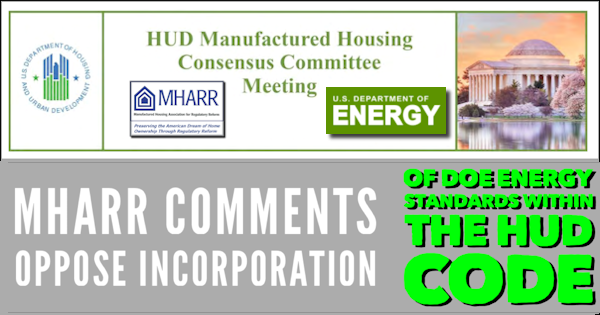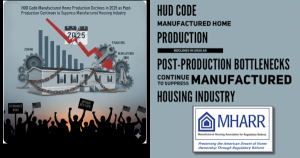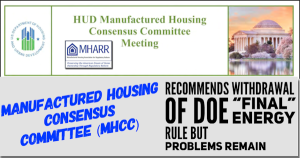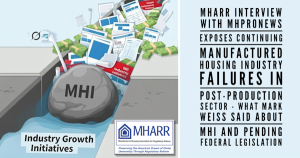MHARR Comments Oppose Incorporation of DOE Energy Standards Within the HUD Code

The Manufactured Housing Association for Regulatory Reform (MHARR) has filed written comments (copy attached) with the Manufactured Housing Consensus Committee (MHCC) opposing the incorporation or summary “alignment” of U.S. Department of Energy (DOE) manufactured housing “energy conservation” standards within the Federal Manufactured Housing Construction and Safety Standards (FMHCSS) maintained by the U.S. Department of Housing and Urban Development. MHARR’s November 9, 2022 comments were submitted in advance of a scheduled November 15-17, 2022 MHCC meeting in Washington, D.C., to consider the integration of the DOE final energy standards with the FMHCSS.
Both the excessive cost of the DOE energy rule and its complete unsuitability for manufactured housing and the manufactured housing market, as well as the legal mangle now facing HUD (and DOE) with respect to the enforcement of the standards, could have been avoided if DOE had properly consulted with HUD and the MHCC – as required by section 413 of the Energy Independence and Security Act of 2007 (EISA) – from the very start. Instead, DOE unlawfully relegated such “consultation” to meaningless after-the-fact activity, while MHI urged and supported the sham “negotiated rulemaking” used by DOE and its energy/climate special interest allies to sidestep the type of real and legitimate consultation that could have avoided the current morass. Now, the industry faces the consequences of that instinct to “go along,” as the DOE energy standards are slated to go into effect on May 31, 2023.
While MHARR has called for MHI to lead an industry lawsuit to obtain an injunction against the DOE standards as the only available remedy that could be secured in time to stop those baseless and unlawful standards, MHI, instead, is stubbornly pursuing corrective legislation as part of a so-called “multi-pronged” strategy. In the wake of the November 8, 2022 election, however, it is – or should be – obvious that a legislative remedy is simply not in the cards, with razor-thin results in both houses guaranteeing that a presidential veto would be all but impossible to overturn (even if such legislation could ever be secured in the first place).
As a result, litigation remains the only potential remedy that could stop the DOE standards before they begin doing severe damage to the industry.
Consistent with this approach, MHARR’s comments strongly oppose the wholesale incorporation of the DOE standards within the HUD Code, or the incorporation of any “aligned” variant of the DOE standards without full notice and comment rulemaking as required by federal manufactured housing law.
MHARR will continue its consistent and aggressive opposition to the implementation of the excessively costly and destructive DOE manufactured housing energy standards and will continue to urge MHI-led industry legal action to enjoin those standards prior to their scheduled May 31, 2023 implementation date.
Manufactured Housing Association for Regulatory Reform (MHARR)
1331 Pennsylvania Ave N.W., Suite 512
Washington D.C. 20004
Phone: 202/783-4087
Fax: 202/783-4075
Email: MHARR@MHARRPUBLICATIONS.COM
Website: manufacturedhousingassociation.org

The Manufactured Housing Association for Regulatory Reform (MHARR) has filed written comments (copy attached) with the Manufactured Housing Consensus Committee (MHCC) opposing the incorporation or summary “alignment” of U.S. Department of Energy (DOE) manufactured housing “energy conservation” standards within the Federal Manufactured Housing Construction and Safety Standards (FMHCSS) maintained by the U.S. Department of Housing and Urban Development. MHARR’s November 9, 2022 comments were submitted in advance of a scheduled November 15-17, 2022 MHCC meeting in Washington, D.C., to consider the integration of the DOE final energy standards with the FMHCSS.
Both the excessive cost of the DOE energy rule and its complete unsuitability for manufactured housing and the manufactured housing market, as well as the legal mangle now facing HUD (and DOE) with respect to the enforcement of the standards, could have been avoided if DOE had properly consulted with HUD and the MHCC – as required by section 413 of the Energy Independence and Security Act of 2007 (EISA) – from the very start. Instead, DOE unlawfully relegated such “consultation” to meaningless after-the-fact activity, while MHI urged and supported the sham “negotiated rulemaking” used by DOE and its energy/climate special interest allies to sidestep the type of real and legitimate consultation that could have avoided the current morass. Now, the industry faces the consequences of that instinct to “go along,” as the DOE energy standards are slated to go into effect on May 31, 2023.
While MHARR has called for MHI to lead an industry lawsuit to obtain an injunction against the DOE standards as the only available remedy that could be secured in time to stop those baseless and unlawful standards, MHI, instead, is stubbornly pursuing corrective legislation as part of a so-called “multi-pronged” strategy. In the wake of the November 8, 2022 election, however, it is – or should be – obvious that a legislative remedy is simply not in the cards, with razor-thin results in both houses guaranteeing that a presidential veto would be all but impossible to overturn (even if such legislation could ever be secured in the first place).
As a result, litigation remains the only potential remedy that could stop the DOE standards before they begin doing severe damage to the industry.
Consistent with this approach, MHARR’s comments strongly oppose the wholesale incorporation of the DOE standards within the HUD Code, or the incorporation of any “aligned” variant of the DOE standards without full notice and comment rulemaking as required by federal manufactured housing law.
MHARR will continue its consistent and aggressive opposition to the implementation of the excessively costly and destructive DOE manufactured housing energy standards and will continue to urge MHI-led industry legal action to enjoin those standards prior to their scheduled May 31, 2023 implementation date.
Manufactured Housing Association for Regulatory Reform (MHARR)
1331 Pennsylvania Ave N.W., Suite 512
Washington D.C. 20004
Phone: 202/783-4087
Fax: 202/783-4075
Email: MHARR@MHARRPUBLICATIONS.COM
Website: manufacturedhousingassociation.org













